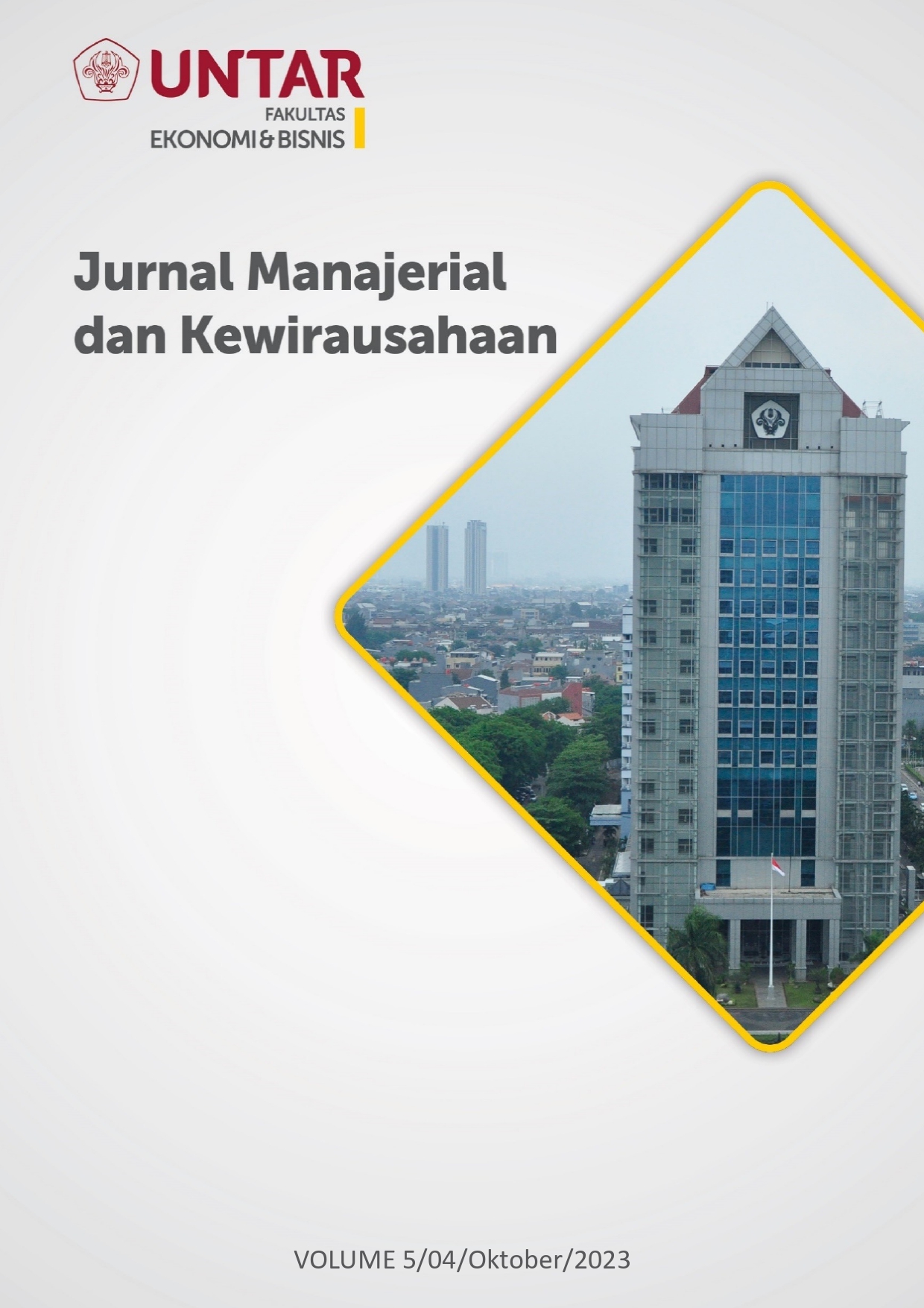Pengaruh Brand Image dan Brand Personality terhadap Brand Loyalty dengan Brand Trust sebagai Variabel Mediasi Pelanggan The Body Shop di Jakarta
Main Article Content
Abstract
The purpose of this study was to examine the effect of brand image and brand personality on brand loyalty and to test brand trust as a medium between brand image, brand personality and brand loyalty. The population of this research is 100 customers of The Body Shop in Jakarta. The convenience sampling method is used by distributing online questionnaires which are then processed using smartPLS-SEM. The results of this study are 1. Brand Image has a positive influence on the brand trust of The Body Shop in Jakarta. 2. Brand Image has a positive influence on brand loyalty of The Body Shop in Jakarta. 3. Brand Personality has a positive influence on the brand trust of The Body Shop in Jakarta. 4. Brand Personality has a positive influence on brand loyalty of The Body Shop in Jakarta. 5. Brand Trust has a positive influence on Brand Loyalty at The Body Shop in Jakarta. 6. Brand Image has a positive influence on Brand Loyalty through Brand Trust The Body Shop in Jakarta. 7. Brand Personality has a positive influence on Brand Loyalty through Brand Trust The Body Shop in Jakarta.
Article Details
Section

This work is licensed under a Creative Commons Attribution-NonCommercial-ShareAlike 4.0 International License.
This work is licensed under a Jurnal Muara Ilmu Ekonomi dan Bisnis Creative Commons Attribution-ShareAlike 4.0 International License.,/p>
References
Ang, C. E. & Keni. (2020). Prediksi Brand Experience dan Brand Image terhadap Brand Loyalty: Brand Trust sebagai Variabel Mediasi. Jurnal Manajerial dan Kewirausahaan, 3(1), 42–51. https://doi.org/10.24912/jmk.v3i1.11286
Hair, J. F., Risher, J. J., Sarstedt, M., & Ringle, C. M. (2019). When to use and how to report the results of PLS-SEM. European Business Review, 31(1), 2-24.
Henseler, J., Ringle, C. M., & Sarstedt, M. (2015). A new criterion for assessing discriminant validity in variance-based structural equation modeling. Journal of the Academy of Marketing Science, 43(1), 115-135.
Hermanto, L. A., & Rodhiah, R. (2019). Pengaruh Brand Personality Terhadap Purchase Intention Produk The Body Shop. Jurnal Manajerial dan Kewirausahaan, 1(4), 820-829. https://doi.org/10.24912/jmk.v1i4.6569
Kompas. (2021). Ditengah Pandemi Covid-19 Industri Kosmetik Mampu Tumbuh Signifikan.
Kotler, P., & Armstrong (2006). Dasar-Dasar Pemasaran, (terjemahan Alexander Sindoro). Jakarta: Prenhallindo.
Lee, H., & Jee, Y. (2016). The impacts of brand asset of domestic screen golf playing systems upon brand trust and brand loyalty. International Journal of Sports Marketing and Sponsorship, 17(4), 320-332.
Mabkhot, H. A., Salleh, S. M., & Shaari, H. (2016). The mediating effect of brand satisfaction on the relationship between brand personality and brand loyalty: Evidence from Malaysia. Management Science Letters, 87-98.
Malhotra, N. K. (2010). Marketing research an applied orientation 6th ed. England: Pearson Educated Limited.
Malhotra, N. K. (2015). Essentials of marketing research: A hands-on orientation. Pearson Education 2015.
Sekaran, U. (2003). Research methods for business a skill building approach 4th ed. New York: John Wiley & Sons.
Sekaran, U., & Bougie, R. (2013). Research methods for business: A skill-building approach (6th ed.). Wiley.
Tribun Lifestyle. (2013). The Body Shop Indonesia Raih Penghargaan karena Peduli Lingkungan.
Tong, X., Su, J., & Xu, Y. (2017). Brand personality and its impact on brand trust and brand commitment: An empirical study of luxury fashion brands. International Journal of Fashion Design, Technology and Education, 11(2), 196-209.
Villagra et al. (2021). Pengaruh Kepribadian Merek, Pengalaman Merek, dan Cinta Merek The Body Shop terhadap Loyalitas Merek. Journal of Trends Economics and Accounting Research, 2(4), 93-99.
Wilson, N., Keni, K. & Tan, P. H. P. (2021). The Role of Perceived Usefulness and Perceived Ease of Use Toward Satisfaction and Trust which Influence Computer Consumers' Loyalty in China. Gadjah Mada International Journal of Business, 23(3), 262-294. https://doi.org/10.22146/gamaijb.32106

